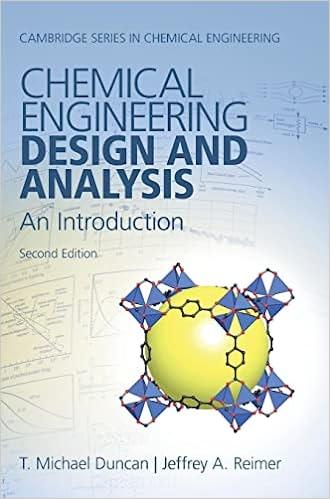Question
Suppose that you have, at your disposal, a CSTR. The reaction, A+B -> C is irreversible. It occurs with no appreciable density change with conversion.
Suppose that you have, at your disposal, a CSTR. The reaction, A+B -> C is irreversible. It occurs with no appreciable density change with conversion. Your reactor volume is 84 gal. You will use two feed lines, one for each reactant. Each reactant comes in the form of 3.5 M solutions in a common solvent. You feed will be stoichiometric. You want to ultimately set the single-effluent line to 0.5 gal/min at steady state (meaning, 0.25 gal/min in each feed line at SS).
1. Suppose that you can fill the tank essentially instantaneously, and you let the reactor operate in batch mode until you match the concentration of C that the CSTR would have under steady state (SS). How long does it take to reach that? More data: The rate law, in this case, involves product inhibition and order of for B: = 1**^1/2/(1 + 2*) With k1 = 0.0941 L^1/2/(mol^1/2.sec), and k2 = 3.99 L/mol.
2. You realize that filling it up instantaneously is Disneyland, but at least you now have a crude start-up estimate: you would open you feed and effluent lines to SS values once your batch-mode tank is ready to become a CSTR. Lets suppose now that you can realistically fill one fifth of its volume nearly instantaneously with your reactants solutions, without literally creating a splash. Then, you will operate it as a semi-batch reactor i.e., you will adjust the two feed lines volumetric flowrates (but keeping them identical all the time) so as to land exactly at the species SS concentrations right when you fill the reactor up. That would be cool, because at that point you would set inlet and outlet volumetric flow rates to those at SS, and your effluent quality would be preserved. Find the time it takes to fill it up while adjusting the two volumetric flow rates to constant values that result in SS concentrations at t filling.
3. Learn about a clever way to shutdown a CSTR while preserving SS composition all the way to zero volume called the constant RTD shutdown strategy (Nauman, p. 524). We will discuss it during our lecture too. At = 0.1, calculate the time it takes to empty the full reactor operating at SS, and plot V(t) vs t all the way to t empty.
Step by Step Solution
There are 3 Steps involved in it
Step: 1

Get Instant Access to Expert-Tailored Solutions
See step-by-step solutions with expert insights and AI powered tools for academic success
Step: 2

Step: 3

Ace Your Homework with AI
Get the answers you need in no time with our AI-driven, step-by-step assistance
Get Started


